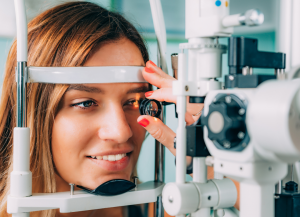-
See the Difference: Save $1,000 on LASIK , Find More
*Must mention this promotion and be treated in October of 2024 to qualify. $1,000 off for both eyes on standard Wavelight price, $500 off for one eye. Cannot be combined with any other offers.
Why You Should See an Optometrist After You Get LASIK
The Importance of Regular Eye Exams After LASIK

At LasikPlus, we understand that opting for LASIK surgery is a significant investment in your vision and overall well-being. LASIK offers remarkable benefits, such as enhanced vision and reduced dependence on corrective eyewear. However, it’s crucial to recognize that the journey towards optimal eye health doesn’t end after the procedure. Regular eye exams remain a cornerstone of maintaining excellent vision and safeguarding your eye health for the long term.
Why Annual Eye Exams Matter
Annual comprehensive eye exams are not merely routine check-ups; they are essential for monitoring your eye health and detecting any potential issues early on. Your eyes serve as windows into your overall health, providing valuable insights that extend beyond vision correction. Through thorough examination, your optometrist can identify various conditions, including those that may not exhibit noticeable symptoms.
Detecting Silent Threats
Many eye diseases, such as glaucoma, diabetic retinopathy, and macular degeneration, can silently progress without causing obvious symptoms until irreversible damage occurs. Early detection through regular eye exams is critical for initiating timely interventions and preserving your vision. By monitoring changes in your eye health, your optometrist can implement proactive measures to mitigate risks and optimize treatment outcomes.
Beyond Vision Correction
While LASIK surgery can significantly improve your vision, it’s essential to recognize that your visual needs may evolve over time. Factors such as aging, environmental factors, and underlying health conditions can influence your eye health and visual acuity. Regular eye exams allow your doctor to assess any changes in your vision and recommend appropriate interventions.
What to Expect During a Comprehensive Eye Exam

During your annual eye exam, the optometrist will conduct a comprehensive assessment to evaluate various aspects of your eye health and visual function. Here are some key components of the examination:
Vision Testing
The Optometrist will assess your visual acuity to determine if you require any corrective measures, such as glasses or contact lenses. Additionally, they will evaluate your depth perception, color vision, and peripheral vision to gain a comprehensive understanding of your visual capabilities.
Eye Health Evaluation
Using advanced diagnostic techniques, your doctor will examine the internal and external structures of your eyes to detect any abnormalities or signs of disease. This includes assessing the health of your retina, optic nerve, and lens, as well as screening for conditions such as cataracts, glaucoma, and retinal disorders.
Refractive Assessment
If you’ve undergone LASIK surgery or other vision correction procedures, your optometrist will monitor the stability of your vision and assess the need for any additional treatments or enhancements. Our goal is to ensure that you continue to enjoy clear, comfortable vision long after your initial procedure.
Maximizing the Benefits of LASIK Through Ongoing Care
While LASIK can yield remarkable results, it’s essential to recognize that maintaining optimal eye health is a collaborative effort that requires ongoing commitment and proactive care. By prioritizing annual eye exams you can:
Monitor Vision Changes:
Regular exams enable your optometrist to monitor any changes in your vision carefully. Addressing these changes promptly helps maintain your visual clarity and prevents further deterioration.
Preserve Eye Health:
Early detection and management of eye conditions are crucial for preserving your long-term eye health. The goal is to ensure that your eyes remain healthy and vibrant.
Ensure Long-Term Satisfaction:
We are dedicated to ensuring your continued satisfaction with the results of your LASIK procedure. Whether you need additional treatments or adjustments in the future, our team is here to provide ongoing support and guidance.
Conclusion
Visiting your optometrist once a year provides a baseline against which to measure potential vision changes and the progression of eye conditions or other medical problems. It makes a significant difference in your vision, your health, and your quality of life.
For LASIK surgeons who provide a lifetime guarantee on laser-corrected vision results, eligibility for future enhancements may be based on having an annual eye exam.
YOU MIGHT ALSO LIKE...
VISION CENTERS NEAR ME
Enter your zip code, city, or a doctor name below to find a vision center.
Find out if LASIK is right for you
Congratulations!
Your vision issues can most likely be corrected with a LASIK procedure. Schedule a free consultation today.
Answer 5 simple questions to see if you are a candidate
What is your age group?
Do you wear...
With corrective lenses, do you have...
Have you ever been told that you have astigmatism?
Have you ever been told that you have dry eyes?
Request an Information Kit
Learn about your surgeon, the latest advanced technology, procedures, options and benefits, financing options, and what to expect from your LASIKPlus experience.


![Avoid Eye Irritation & Keep Eye Heath [Tips]](/wp-content/uploads/2017/01/blog-50.1-266x168.jpg)






